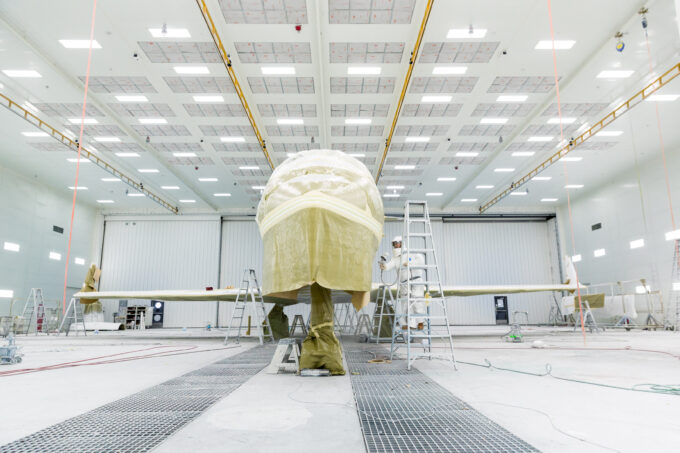The global pandemic has brought a new generation of business leaders to the fore, one that achieved success during the past year by embracing honesty and authenticity, believing in their organization’s long-term objectives and equipping themselves with the tools to quickly identify and resolve problems, says Bill George, Harvard Business School senior fellow, best-selling author and headliner for this year’s NBAA Leadership Summit.
Traditional management methods are at odds with the modern world, says George, who as chairman and CEO of medical device maker Medtronic guided the company in the 1990s. Instead, business leaders need to look beyond the balance sheet and recognize, as the U.S. military has done, that we operate in a volatile, uncertain, complex and ambiguous world, one in which technological advancement and shifting geopolitical ideologies have fundamentally changed how business leaders make decisions.
Drawing on his extensive business experience and the wisdom of the U.S. War College’s volatile, uncertain, complex and ambiguous (VUCA) approach to strategic thinking, George has developed a new set of management principles that he calls VUCA 2.0, which underscores the need for business leaders to use vision, understanding, courage and adaptability to succeed.
“Companies want leaders who are passionate about pursuing the organization’s mission and inspire the entire team to rally around that purpose. ”
BILL GEORGE Senior Fellow, Harvard Business School
Central to VUCA 2.0 is the concept of True North.
“A person’s True North is their beliefs, their values, their principles, their moral compass – the elements that make a person who they are,” explained George. “Companies want leaders who are passionate about pursuing the organization’s mission and inspire the entire team to rally around that purpose.
“It has to be much more than just making money,” George continued. “It’s about giving people the freedom to make decisions. The pandemic showed us that those organizations that were flexible and adaptable enough to empower their frontline workers were the ones that did the best.”
Tools for Today
Leaders need a proven set of tools that adapt to today’s business and political climate, and George says VUCA 2.0 is tailored for the modern business environment.
“The most important thing a leader must have is a vision that is clear about the mission, the value and strategy of an organization,” he explained. “It’s like being a sailor: you have to know where you’re sailing to so that no matter how buffeted by the winds you may be, you have a clear objective and destination in your mind. Companies that have a clear sense of purpose and vision have fared much better during this pandemic than those that didn’t.”
Once a vision is established, leaders must assess the strengths and weaknesses of their organization to understand how it can successfully navigate an unpredictable business and political landscape, says George.
“Leadership requires an in-depth understanding of an organization. To obtain that information, you have to seek it out. Leaders need to tap into myriad sources covering the full spectrum of viewpoints by engaging directly with their customers and employees to ensure they are attuned to changes in their markets,” he said.
“Today, leaders also need to understand the world. The current political climate has made it extremely challenging, especially for leaders of global organizations, to maintain common products and common ways of operating,” declared George.
Courage Required
Equipped with vision and understanding, a good leader also needs the courage to apply both of them, says George.
“Having the courage to make bold decisions is really important for a business leader in today’s world,” says the Harvard senior fellow.
The COVID crisis has shown that leaders also require the courage to delegate decision-making power.
“The pandemic has shown us the importance of our frontline workers. For years, organizations have diminished the value of their frontline staff to such an extent that it was adopted as standard practice. The leaders who succeeded in the pandemic had the courage to break from tradition and empower frontline workers.”
A volatile, uncertain, complex and ambiguous world also requires leaders to be prepared for the unexpected and to be flexible enough to guide an organization through a crisis, says George.
“For years now, leaders have needed to be flexible and ready to rapidly adapt to changing external circumstances, without altering strategic course. The pandemic only emphasized the need for leaders to make quick and sometimes difficult decisions to cope with unforeseen events, and those who were unable or unwilling to do that struggled the most during this past year,” noted George.
“The skills needed to be a good leader, like a strong emotional intelligence, are learned, so approach leadership like a top athlete. ”
BILL GEORGE Senior Fellow, Harvard Business School
Dedicated to Self-Improvement
Finally, leaders must dedicate time to self-improvement to achieve the best results from business principles like VUCA 2.0, asserts George.
“The skills needed to be a good leader, like a strong emotional intelligence, are learned, so approach leadership like a top athlete. Develop your skills and continue to hone them throughout your career,” he suggested.
Leaders also need to be aware of potential distractions, warns George.
“Don’t get caught up with trying to get a promotion, or get seduced by making more money, and avoid the politics or you will lose sight of your organization’s objectives and lose sight of your own personal goals,” he noted.
“Also, too many people concentrate on ways to cut costs rather than ways to improve quality. The truth is that the cost of failed quality is far greater than any savings you can get from cutting labor costs,” declared George.

Duncan Aviation’s Vision
Maintenance, repair and overhaul service provider Duncan Aviation benefited from a strong vision during the pandemic, says Lori Johnson, the company’s corporate and marketing communications manager.
“Putting vision to the test, Duncan Aviation quickly implemented a contingency plan in mid-March, immediately after the global pandemic was declared,” said Johnson. “We moved labor from slower areas to busier ones, something we were able to do because we cross-trained our team members to allow for this. With the recent workforce issues the industry still predicts in the future for maintenance technicians, Duncan Aviation wanted to prevent layoffs and furloughs, ensuring our current workforce remained intact. We anticipated that once conditions improve, we will need all of our team members, and it is expensive and time-consuming to replace them,” she added.
“Only by staying focused on their purpose and staying close to their customers have business aviation organizations been able to not only survive the last year, but make long-term decisions that ensure they will emerge from the current challenge in a strong position,” Johnson concluded.

Clay Lacy Applied Change Management
Adaptability was key to Clay Lacy Aviation’s pandemic response, says the company’s vice president of fleet development, Joseph Barber, CAM.
“2020 quickly became the year of change management,” explained Barber. “With 40% fewer [flight] operations and the determination to keep our staff and resources ready for recovery, our teams became busier than ever, adopting new technology platforms like scheduling software, customer interfaces, business intelligence tools and customer relationship management,” he said.
“In a time when aircraft cleaning and sanitation services were struggling to invest in new equipment for cleaning, we developed a standard for sanitization and ionizing treatments that are industry-leading. We also invested in the education and professional development of our staff with certified aviation manager certification. In addition, we encouraged the pursuit of higher education and updated our training programs,” explained Barber.
“Taking on those initiatives in a year with typical operating volume would have been monumental. However, we turned the ambiguity into action and agility.”
Learn More at the Leadership Summit
The virtual NBAA GO 2021 Leadership Summit, which will be held March 24-25, features a full schedule of high-caliber professional speakers who will discuss and evaluate the skills required to navigate uncertain times, including emotional intelligence, change management, communication, connection and accountability.



 International Business Aviation Council Ltd.
International Business Aviation Council Ltd.